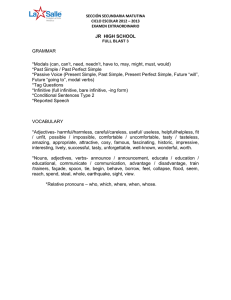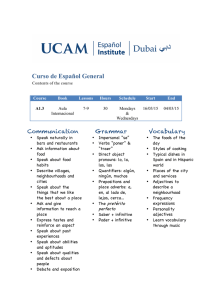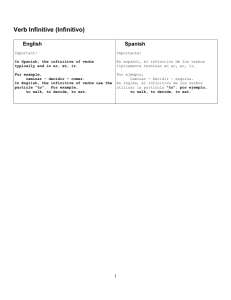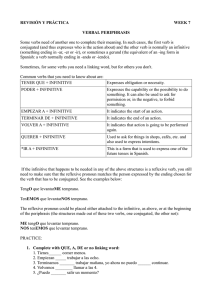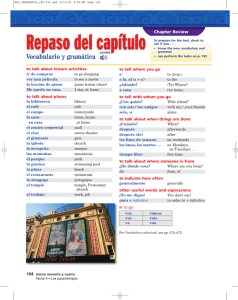some infinitive structures in asturian
Anuncio
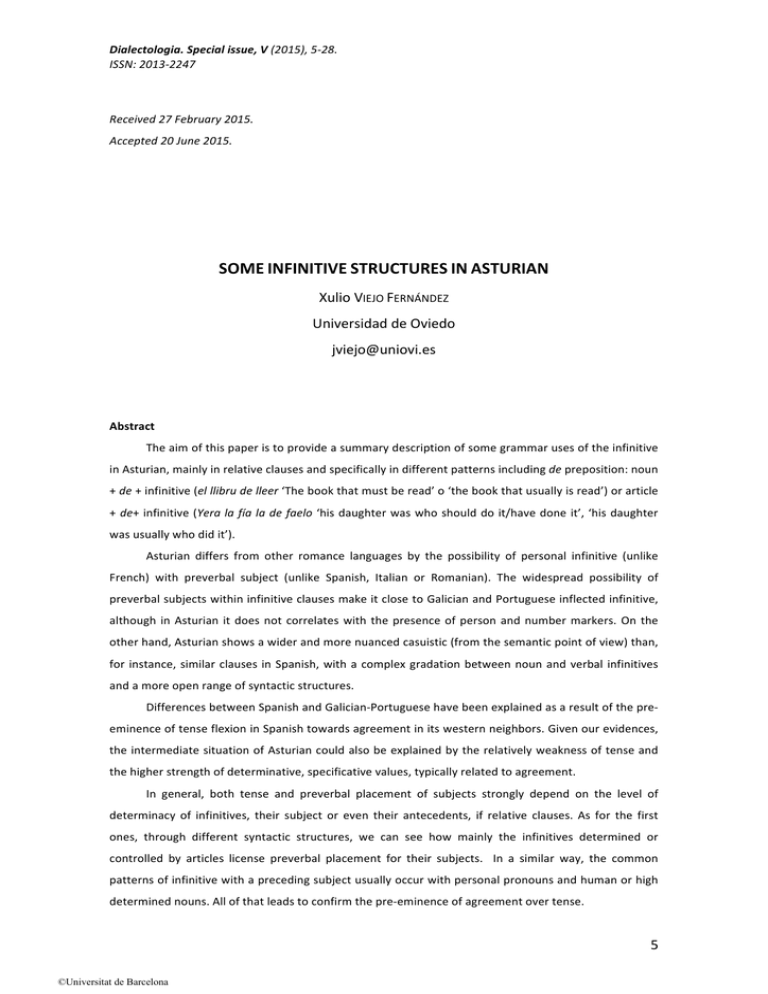
Dialectologia.Specialissue,V(2015),5-28. ISSN:2013-2247 Received27February2015. Accepted20June2015. SOMEINFINITIVESTRUCTURESINASTURIAN XulioVIEJOFERNÁNDEZ UniversidaddeOviedo [email protected] Abstract Theaimofthispaperistoprovideasummarydescriptionofsomegrammarusesoftheinfinitive inAsturian,mainlyinrelativeclausesandspecificallyindifferentpatternsincludingdepreposition:noun +de+infinitive(elllibrudelleer‘Thebookthatmustberead’o‘thebookthatusuallyisread’)orarticle +de+infinitive(Yeralafíaladefaelo‘hisdaughterwaswhoshoulddoit/havedoneit’,‘hisdaughter wasusuallywhodidit’). Asturian differs from other romance languages by the possibility of personal infinitive (unlike French) with preverbal subject (unlike Spanish, Italian or Romanian). The widespread possibility of preverbalsubjectswithininfinitiveclausesmakeitclosetoGalicianandPortugueseinflectedinfinitive, although in Asturian it does not correlates with the presence of person and number markers. On the otherhand,Asturianshowsawiderandmorenuancedcasuistic(fromthesemanticpointofview)than, for instance, similar clauses in Spanish, with a complex gradation between noun and verbal infinitives andamoreopenrangeofsyntacticstructures. DifferencesbetweenSpanishandGalician-PortuguesehavebeenexplainedasaresultofthepreeminenceoftenseflexioninSpanishtowardsagreementinitswesternneighbors.Givenourevidences, theintermediatesituationofAsturiancouldalsobeexplainedbytherelativelyweaknessoftenseand thehigherstrengthofdeterminative,specificativevalues,typicallyrelatedtoagreement. In general, both tense and preverbal placement of subjects strongly depend on the level of determinacy of infinitives, their subject or even their antecedents, if relative clauses. As for the first ones, through different syntactic structures, we can see how mainly the infinitives determined or controlled by articles license preverbal placement for their subjects. In a similar way, the common patternsofinfinitivewithaprecedingsubjectusuallyoccurwithpersonalpronounsandhumanorhigh determinednouns.Allofthatleadstoconfirmthepre-eminenceofagreementovertense. 5 ©Universitat de Barcelona X.VIEJOFERNÁNDEZ Meanwhile, some idiomatic structures considered show how temporal meaning tends to be displaced in infinitive clauses by aspectual, modal o contrafactual senses. This gives an idea of the weakness of tense in infinitive clauses and, otherwise, correlates to a higher tendency to preverbal subjects,undertheconditionsmentionedabove. Finally,togetherwiththesemanticsofverbsasaregulatoryfactorfortheplacementofsubject, it can be seen how its position may strongly depend on certain kind of pragmatic assumptions of the discourselevel. Keywords infinitive,subject,Asturian,relativeclauses,flexion ALGUNASESTRUCTURASDEINFINITIVOENASTURIANO Resumen Elpropósitodeesteartículoesaportarunasomeradescripcióndealgunosusosgramaticalesdel infinitivoenasturiano,fundamentalmenteenoracionesderelativoyespecialmenteenconstrucciones conpreposiciónde:nombre+de+infinitivo(elllibrudelleer“ellibroquehayqueleer”,“ellibroque normalmenteselee”oartículo+de+infinitivo(yeralafíaladefaelo“erasuhijaquienlodebíahacer”, “erasuhijaquiennormalmentelohacía”). Elasturianosediferenciadeotraslenguasrománicasporlaposibilidaddeuninfinitivopersonal (a diferencia del francés) con sujeto preverbal (frente a español, italiano o rumano). La posibilidad se sujetos preverbales dentro de cláusulas de infinitivo lo aproximan al infinitivo flexionado de gallego y portugués, si bien en asturiano ello no se correlaciona con la presencia de morfemas de número y persona.Porotrolado,elasturianomuestraunacasuísticamásampliaymatizada(desdeelpuntode vista semántico) que los patrones equivalentes en castellano, con una compleja gradación entre infinitivosverbalesynominalesyunelencomásabiertodeestructurassintácticas.Lasdiferenciasentre español gallego-portugués vienen siendo explicadas como efecto de la preeminencia de la flexión de tiempo en español frente a la de concordancia en los romances occidentales vecinos. Nuestros datos permitiríanentenderlaposiciónintermediadelasturianoporlarelativadebilidaddelaflexióntemporal yelmayorpesodelosvaloresdeterminativosyespecificativostípicamenteasociadosalaconcordancia. Engeneral,tantolosvalorestemporalescomolaposiciónpreverbaldelsujetodependenengran medida del nivel de determinación de los infinitivos, de su sujeto o incluso de sus antecedentes en el caso de cláusulas de relativos. En cuanto a lo primero, a través de distintas estructuras sintácticas, puede comprobarse como son sobre todo los infinitivos determinados mediante artículo los que habilitanlaposiciónpreverbaldelsujeto.Demodosimilar,enelpatrónmáshabitualdeinfinitivocon sujetoprecedente,esterolsuelendesempeñarlopronombrespersonalesobiennombrespersonaleso altamentedeterminados.Todoellollevaríaaconfirmarlapreeminenciadelaconcordanciasobreeltiempo. 6 ©Universitat de Barcelona Dialectologia.Specialissue,V(2015),5-28. ISSN:2013-2247 Asimismo, ciertas estructuras idiomáticas consideradas muestran como el significado temporal tiendeaserdesplazadoenlascláusulasrelativasporsentidosaspectuales,modalesocontrafactuales. Ellodaunaideadeladebilidaddeltiempoenlascláusulasderelativoy,porotraparte,secorresponde conunafuertetendenciaasujetospreverbales,bajolascondicionesanteriormenteindicadas. Finalmente,juntoalasemánticadelverbocomofactorreguladordelaposicióndelsujeto,puede verse como esta llega a depender fuertemente de cierto género de presuposiciones pragmáticas de niveldiscursivo. Palabrasclave infinitivo,sujeto,asturiano,cláusulasderelativo,flexión 1.Introduction The aim of this paper is to describe, in a purely expository way, some idiosyncratic uses of the infinitive in Asturian. Asturian differs from other romance languages(Piera1987;Ledgeway1998;Mensching2000;Scida2004;Schulte2007)by the possibility of personal infinitive (unlike French) with preverbal subject (unlike Spanish, Italian or Romanian). This make it close to Galician (García Gondar 1978; Longa1994)andPortugueseinflectedinfinitive(Raposo1987;DaSilva2008),though inAsturianinfinitivelacksofpersonandnumberinflection.Inthiswork,wewillfocus ontherulesofsubjectplacementinthislanguagewithrespecttonominal,verbaland relativeinfinitives.Wewillnotrefertoeitherinterrogativeorexclamativeinfinitivesor infinitivesasadjectivalcomplements. 2.Nominalinfinitives Nominal infinitives may be accompanied, like in Spanish (Ramírez 2003), by determiners (typically a definite article, el) and different syntactic arguments. When article el appears before infinitive, its arguments should usually occupy postverbal position, even those interpretable as subjects, either nominative (1) or prepositional 7 ©Universitat de Barcelona X.VIEJOFERNÁNDEZ subject,insertedbyprepositionde(2): (1) Ellladrarlosperrosespertómepelanueche Thetobarkthedogswokeup-meat-thenight “Thebarkingofdogswokemeupatnight” (2) Ellladrardelosperrosespertómepelanueche Thetobarkofthedogs wokeup-me at-thenight “Thebarkingofdogswokemeupatnight” Nonetheless,thelackofarticleallowspreverbalplacementforinfinitivesubjects incertaincontexts,likeincopularsentences: (3) Aprobarelloslapropuestavaserdifícil(/Ellosaprobar…) Toapprovetheytheproposalwillbedifficult(/they toapprove…) “Itwillbedifficultforthemtoapprovetheproposal”(cf.PortugueseElesaprovarema propostaserádifícil) GanarFranciaaBrasilyeimpensable(/Franciaganar…) TobeatFrancetoBrazilisinconceivable(/Francetobeat…) “It’s inconceivable that France beats Brazil” (cf. French La France battre le Brésil, ce seraitinconcevable) SanarMaríafoiunagrannoticia(/Maríasanar…) TohealMarywasagreatnews(/Maríatoheal…) “Mary’shealingwaswasgreatnews” Otherwise, the omission of the article-preceding infinitive seems general for a generic(4)nottemporalsense(5),asexpectedofanominaldeterminer: (4) Lladrarlosperrosquitadedormir(/*Losperroslladrar…) Tobarkthedogspreventsoftosleep(Thedogstobark…) “Thebarkingofdogspreventssleeping” Ruxirl’airequitadedormir(*L’aireruxir…) Toroarthewindpreventsoftosleep(Thewindtoresound…) “Theroaringofwindpreventssleeping” 8 ©Universitat de Barcelona Dialectologia.Specialissue,V(2015),5-28. ISSN:2013-2247 (5) *Lladrarlosperrosespertómepelanueche(/*losperroslladrar) Tobarkthedogswokeup-meatthenight(/Thedogstobark…) “Thebarkingofdogswokemeupatnight” However, infinitives without article are also possible with causative or experimentalverbs,evenexpressingatemporalvalue,alwayswithpostponedsubject (as8): (6) Lladrarlosperrosalertónosdelapresenciad’estraños(*losperroslladrar…) Tobarkthedogswarned-usofthepresenceofstrangers(*Thedogstobark…) “Barkingdogswarnedusofthepresenceofstrangers” Ruxirl’airedesanimólosdesalir(*L’aireruxir…) Toroarthewinddiscouraged-themoftoleave(*Thewindtoresound…) “Roaringwinddiscouragedthemtoleave” Thus, main verb determines the position of the subject in the clause and provides tense to the infinitive, depending on either the presence of article or the semantic features involved. In this sense, subjects referred to human beings show a particularbehavior.Ifcommonnouns,postverbalplacementisanywaysrequired: (7) (El)colarlafíadionosunagranpena/*(El)lafíacolar… (The)todepartthedaughterbrought-usagreatsorrow/(The)thedaughter… “Thedepartureofourdaughterbroughtusgreatsorrow” (El)cantarlosneñosalegrónoslacasa/*(El)losneñoscantar… (The)tosingthechildrengladenedusthehome/*(The)thechildrentosing “Thesingingofchildrengladenedourhome” However, with a higher degree of determinacy (when subject is expressed by proper names or pronouns), the article-preceding infinitive is precisely which allows bothpreverbalandpostverbalposition: (8) ColarMaríadionosunagranpena/*Maríacolar… TodepartMarybrought-usagreatsorrow/*Maríatodepart… 9 ©Universitat de Barcelona X.VIEJOFERNÁNDEZ “Mary’sdeparturebroughtusgreatsorrow” Trabayartupelanuechenun-yprestaalafamilia/*Tutrabayar… Toworkyouat-thenightnot-thempleasestothefamily/*Youtowork… “Yourworkingatnightdoesn’tpleaseyourfamily” (9) ElcolarMaríadionosunagranpena/ElMaríacolar…. ThetodepartMarybrought-usagreatsorrow/TheMarytodepart… “Mary’sdeparturegaveusgreatsorrow” Eltrabayartupelanuechenun-yprestaalafamilia/Eltutrabayar… Thetoworkyouat-thenightnot-thempleasestothefamily/Theyoutowork“Your workingatnightdoesn’tpleaseyourfamily” As seen in (7), (8), (9) the lack of article in this kind of subjects allows their antepositiontoinfinitiveonlywhenthisisdeterminedbyel,whiletheco-occurrence ofarticleswithbothinfinitiveandsubjectavoidsit.Evenmore,thoughthearticleof infinitive usually prevails over that of noun, in copular sentences (as seen in 3) even thearticleofthesubjectcantakethecontroloverthewholeinfinitiveclauseincaseof preverbalplacement: (10) Ellladrarlosperrosyenormal/Losperroslladraryenormal/*Ellosperroslladrarye normal. “Thebarkingofdogsisanormalthing” Elcantarlosneñosyeseñald’alegría/Losneñoscantaryeseñald’alegría/*Ellosneños cantaryeseñald’alegría. “Thesingingofchildrenisasignofjoy” Therefore, article works as an agreement marker between both of them, its presencebeingobligatoryinthiskindofstructures,aswellasprevalentovertense,in asimilarwaytoinfinitiveofGalicianandPortuguese(seealsoRaposo1987:95-97). 3.Verbalinfinitives Let’sconsidernowverbalinfinitiveswhosesubjectissupposedtobethatofthe matrixsentence(11,12).InSpanish,insuchstructures,infinitiveusuallychangesintoa 10 ©Universitat de Barcelona Dialectologia.Specialissue,V(2015),5-28. ISSN:2013-2247 subordinated clause with finite verb when subjects differ (me alegro de venir “I’m happy to come (myself)” but me alegro de que vengas “I’m happy that you come”). Likewise, the so-called influence verbs keep on the same pattern in the first case (se impuso a sí mismo dejar de fumar “he forced himself to quit smoking”) but both optionsifdifferentsubjects(impusoasushijosdejardefumar/quedejasendefumar “heforcedhissonstoquitsmoking”). AsforAsturian,infinitiveispossibleevenwhensubjectsdiffer: (11) Alégromedevenir(yo)/Alégromedevenirtu Rejoicemeoftocome(I)/Rejoicemeoftocomeyou “I’mhappytocome(myself)”/“I’mhappythatyoucome” Confórmomecontrabayar(yo)/Confórmomecontrabayarellos Settleformewithtowork(I)/settleformewithtoworkthey “Isettleforworking(myself)/“Isettleforthemtowork” Andalso: (12) Prometívenir(yo)/Prometívenirlosgüelos Promisedtocome(I)/promisetocomethegrandfathers “Ipromisedtocome(myself)”/“Ipromisedgrandparentswouldcome” Asegúromesabelo(yo)/Asegúromesabeloelles makesure-metoknow-it(I)/Makesure-metoknow-itthey “I’dmakesuretoknowit(myself)”/“I’dmakesurethattheyknowit” Anyways, subordinate clauses are also a common option for the last case (alégromedequevengastu,confórmomeconquetrabayenellos[11],prometíquelos güelosveníen,asegúromequ’elleslosaben,paezmequevosotrostenéisrazón[12]). Notethatinsentenceswithaprepositionalmainverb(11)onlythefirstperson pronounyomayoptionallyprecedetheinfinitive. (13) Alégromedeyovenir/*Alégromedetuvenir “I’mhappytocome(myself)”/“I’mhappythatyoucome” 11 ©Universitat de Barcelona X.VIEJOFERNÁNDEZ Confórmomeconyotrabayar/*Confórmomeconellostrabayar “Isettleforworking(myself)/“Isettlethattheywork” Insuchcases,preverbalpositionimpliesidentitybetweeninfinitivesubjectand addresser.Meanwhile,withnon-prepositionalverbs,anykindofsubjectcanbeplaced beforeinfinitive,ontheconditionofbeingthesameforbothsentenceandclause: (14) Yoprometívenir/Prometíyovenir “Ipromisedtocome(myself)” Yoprometívenirlosgüelos/*Prometíyovenirlosgüelos “Ipromisedgrandparentswouldcome” Tuprometistivenir/Prometistituvenir “Youpromisedtocome(yourself)” Tuprometistivenirlafía/*Prometistituvenirlafía “Youpromisedthatyourdaughterwouldcome”. Analternativemodelcanbefoundinothercontextswhereinfinitiveisoptionally interpretable as a noun complement. Like in Spanish, if subjects differ, subordinates clauseswithfiniteverbarerequired: (15) Tengomieudeviaxar(yo)/dequ’ellaviaxe Havefearoftotravel(I)/ofthatshetravel “I’mafraidoftravelling”/“I’mafraidthatshewilltravel” Yeculpabledeperdese(él)/dequeseperdierenlosneños Isguiltyoftoloss-refl.(he)/ofthatrefl-lost thechildren “Heisguiltyofhavinggetlost”(himself)/“heisguiltyofchildrenhavinggetlost” However, in Asturian, infinitive clauses are also possible even when subjects differ,requiringsomediscourseopeningtobeacceptable: (16) Tengomieudeviaxarella(ynunvolver) Havefearoftotravelshe(andnottocomeback) ‘’I’mafraidthatshewilltravel(andwon’tcomeback)” 12 ©Universitat de Barcelona Dialectologia.Specialissue,V(2015),5-28. ISSN:2013-2247 Yeculpabledeperdeselosneños(ymancase) Isguiltyoftolossthechilden(andhurt) “Heisguiltyofchildrenhavinggetlost(andhurt)” Thus, while in (11) and (13) the subject of infinitive is controlled by addresser, andin(12)and(14)dependsonthecoincidencebetweensentenceandclause,in(1516)itspresenceandpositionrequiresnon-identityofsubjectsbetweensentenceand clause, as well as, at least, the expectative of a second consecutive infinitive, not necessarilyspecified,withthesamesubject.Inanycase,infinitiveclauseiscontrolled fromthediscourselevel. Noteworthyisthatthelastexamplescorrespondtoutterancesorientedeitherto causesandexperimentantsortoconsequences,andthattheycanbeinterpretedina modal way. The same kind of oriented infinitive can be found in some imperative sentences,usuallyperiphrasiswithmovementverbs,inwhichanoriginalpreposition canbeomitted:venllavateyo(“comeheresothatI’llwashyou”),trai’lplatufregalu (“bringmetheplatesothatIcanwashit”),baxadátelu(“comedownandI’llgiveitto you”). The anteposition of subjects is also general in final contexts, similarly to Galician-Portuguese inflected infinitive and even to some varieties of Spanish (NGLE 501-502; Suñer 1986; Morales 1989). Unlike Spanish standard, this kind of infinitives licenseadifferentsubjectfromthatofmatrixsentence,providingevidenceslikethese: (17) Haiquemercarplátanospalosneñosmerendar/pamerendarlosneños “Wemustbuybananasforchildrentosnackon” Truxeronlaferramientapayotrabayar/patrabayaryo “Theyprovidedthetoolsformetowork” Inthesestructureswecannoteaprogressiveassimilationofmodal,probabilistic sense in the infinitive clause at the expense of strictly temporal meaning. The weakening it implies for tense in the infinitive clause could explain the variable position of subject. Actually, in strictly temporal constructions (akin to Spanish antes 13 ©Universitat de Barcelona X.VIEJOFERNÁNDEZ demarcharAna,despuésdevenirJuan,alllegarelmomento,etc.),Asturianoffersa complexphenomenologyconcerningthepossibleplacementofsubject.Ingeneral,it seemstobegovernedbythesamerulescommentedabove(regardingpropernouns andpronouns)givingrisetodifferentsensenuances.Considertheseexamples: (18) AntesdecolarAna/Antesd’Anacolar(Antesd’acabarlaseronda/*Antesdelaseronda acabar) “BeforeAnneleaves”(“Beforeautumnends”) Depués de venir Xuan/ Depués de Xuan venir (Depués de venir l’iviernu/*Depués de l’iviernuvenir) “AfterJohncame”(“AfterWintercame”) Alyollegar/Alllegaryo(Alllegarelmomentu/*Alelmomentullegar) “WhenIcame”(“Whenthemomentarrived”) Butthemorerelevantthinghereistheexpressionofdifferentsensesdepending onthesubjectplacement.Whileitspostpositiontypicallyindicatesthetemporalframe in which the main event develops, preverbal location tends to suggest some contrafactualmeaningintheinfinitiveclausewithregardtomatrixsentence,evenin aninterpellativeway: (19) AntesdetrabayarAna,lafamiliavivíamal BeforeoftoworkAnne,thefamilylivedbadly “BeforeAnnebeganworking,herfamilylivedbadly” Antesd’Anatrabayar,trabayoyo BeforeofAnnetowork,workI “IprefertoworkmyselfratherthanAnne” (20) DepuésdevenirXuan,lescosesmeyoraron AfteroftocomeJohn,thethingsimproved “AfterJohn’scoming,thingsimproved” DepuésdeXuanvenircontantotrabayu,nun-ydaisninlesgracies AfterofJohntocomewithgreatwork,nothimgiveeventhethanks “AlthoughJohncamewithgreateffort,youdon’teventhankhim” 14 ©Universitat de Barcelona Dialectologia.Specialissue,V(2015),5-28. ISSN:2013-2247 (21) Alllegaryo,laxentetabacallao AtthetoarriveI,thepeoplewasquiet ‘WhenIarrived,peoplewasquiet’ Alyollegar,laxentecalló AttheItoarrive,thepeopleshutup “Uponmyarrival,peopleshutup”” Notethatthestrongertemporalmeaning,thehigherprobabilityforpostverbal placements; and the more weakness of tense in favor of modal sense, the higher tendencytopreverbal.Thisseemstobecoherentwiththehigherdegreeofdiscursive opening shown in general by this kind of infinitive clauses with respect to their correlativeswithfiniteverb. Inthisgeneralframe,wearetohighlighttheso-calledrelativeinfinitives.Wewill considertwodifferentkindsofrelativeinfinitiveinAsturian:theoneinsertedbythe typicalrelativepronounsandasecondonethatconsistsonsomeidiomaticpatternsin whichinfinitivesareintroducedbytheprepositiondeoarticle+de. 4.Quien+infinitive In Spanish, relative infinitive clauses are only possible in oblique contexts, the relative depending on the presence of a preposition (alguien con quien hablar “somebodytotalkwith”)orifitsantecedentdoesnotworkassubjectoftheinfinitive (varioslibrosqueleer“somebookstoread”).Moreover,theyusuallyoccurinpatterns withnoantecedent(nohayconquienhablar“there’snobodytotalkwith”)orwhen antecedenthasanindefiniteorgenericsense(nadaquehacer“nothingtodo”)(NGLE, 507). Asturian differentialism concerns personal relative pronoun quien (uninflected fornumber),foritcanrefertotheinfinitivesubjectinnon-prepositionalcontexts: 15 ©Universitat de Barcelona X.VIEJOFERNÁNDEZ (22) Nunhuboquienlaquerer/Nunhuboquienlaquixera Notwaswhohertolove/Notwaswhoherloved “Therewasnobodytoloveher” Tienbienquienluayudar/Tienbienquienluayude Hehaswellwhohimhelp/Hehaswellwhohimhelps “There’salotofpeopletohelphim” Copulativesentencesorwithagenericexistentialsense(¿Nunvendráquiénnos ayudar?, “Would anybody come to help us?”) refuse any explicit antecedent nearly always, as it also happens in other relative clauses with quien and finite verb in Asturian (GLLA 1998: 227-228). On the other hand, if explicit antecedent, the impersonalrelativepronounqueandafiniteverbarerequired: (23) Nun hubo persona que la quixera/*Nun hubo persona quien la querer/*Nun hubo personaquienlaquixera “Therewasnopersonwholovedher” Tien bien parientes que lu ayuden/*Tien bien parientes quien lu ayudar/ *Tien bien parientesquienluayuden “He’sgotmanyrelativeswho’dhelphim” However, specified antecedent is possible when acting as the object of the infinitive: (24) Nunhubopersonaaquienquerer Notwaspersontowhotolove “Therewasnopersonshemight/shouldlove” Tienparientesaquienayudar Hasrelativestowhotohelp “He’sgotrelativeshemight/shouldhelp’ Insuchcases,infinitiveallowshumansubjectsifexpressedbyapropernounora pronoun (see above), the subject agreeing or differing from that of the matrix sentence.Theplacementofthissubjectisfree: 16 ©Universitat de Barcelona Dialectologia.Specialissue,V(2015),5-28. ISSN:2013-2247 (25) Xuantienparientesaquienayudarél/Xuantienparientesaquienélayudar “Johnhasgotrelativestowhomhemight/shouldhelp” Xuantienparientesaquienayudaryo/Xuantienparientesaquienyoayudar. “JohnhasgotrelativesImight/shouldhelp” Therelativeclausecanherebeinsertedbyimpersonalrelativepronounque(cf. Xuan tien parientes a los qu’él ayudar). Nevertheless, a non-human subject does not seem viable in the infinitive clause (*María tien parientes a quien lladrar los perros “Mary has got relatives to whom dogs might/should bark”). Moreover, in (25) it’s visible some modal sense (obligatory or probabilistic), not obvious when relative infinitivesrefertoasubjectantecedent,witharatherfactualsense(see22-23,where it is assumed that “in fact, nobody loves her” or “indeed, he has relatives that help him”). Therefore, we are facing again grammatical constructions akin to the inflected infinitiveinGalicianandPortugueseregardingthepossibilityofapreverbalsubject.In any case, the restriction of this pattern to human subjects (and to relative pronoun quien)isremarkableinlinewiththeabovementionedcases,aswellastheemergence of modal senses in spite of temporal, as seen in previous chapters. Actually, some examples considered there (see 16), though taken from verbal phrases, were also interpretableaspossiblepatternsofrelativeinfinitivewithnominalantecedent(mieu deviaxar).Precisely,aconsequenceofthegrammaticalrelevanceofrelativeinfinitives in Asturian (and more specifically of their constructions with subject) will be the development of some other idiomatic patterns of relative, apart from the typically articulatedbyquien,que,etc. 5.Non-humannoun+prepositionde+infinitive Relative patterns noun + preposition + infinitive are common either in Asturian and Spanish. Though prepositions may vary, we are to circumscribe this analysis to 17 ©Universitat de Barcelona X.VIEJOFERNÁNDEZ cases with de. Note, first of all, that these patterns represent the inverse, complementarymodeltothetypeofnouninfinitiveexemplifiedin(2)(infinitive+de+ noun),aboveanalyzed. In such patterns, the different behavior between human and non-human antecedentshouldbenotedagain.Asforthenon-humannouns,inSpanish,phrases likecañadepescar(“fishingrod”),horadedormir(“timetosleep”),etc.usuallymean typifiedconcepts,implyingastablesemanticlinkbetweenbothelements,sothatthey may be fixed as mere noun phrases without any eventive meaning. But, once again, the same construction happens to be more versatile in Asturian, since it can be referred to a circumstantial link between noun and infinitive, eliciting anyway some modal,obligatoryorprobabilisticmeaning(like25)oratleastsomeintentionalsense: (26) Elcochedepintarmetiéronludientro’lgaraxe Thecaroftopainthaveput-itinsidethegarage “Theymovedthecartobepaintedintothegaraje” On the other hand, the semantic relationship between noun and infinitive is restrictedinSpanishtotheperformativeframeoftheeventmeantbyverb(horade dormir) or else to instrumental, causative factors (caña de pescar). Anyway, a verbobjectrelationshipisneverspecified.Nevertheless,inAsturian,antecedentscanwork astheobjectofinfinitive(in26isthecarthatmustbepainted),somethingespecially visibleinsomeredundantsemanticpatterns: (27) Elllibrudelleertiénesluenribalamesa Thebookoftoreadhave-you-itonthetable “Thebookyoumustreadisonthetable” Elvinodebeberyelod’esabotella Thewineoftodrinkisitofthatbottle “Thewinewecan/mustdrinkisthatinthatbottle” Here, further the modal sense suggested in translation (cf. English a book to read),thereisanaddeddegreeofspecification(abookoraclassofwineareopposed 18 ©Universitat de Barcelona Dialectologia.Specialissue,V(2015),5-28. ISSN:2013-2247 tootherpossible).Thus,thisconstructionaddsbothmodalandspecificativemeaning, notdefinedbyagenericqualitylikeotherkindofrelatives(cf.Porfintopéunllibruque lleer “at last I’ve found a suitable book for me to read”) but through certain performativeconditions. Note the parallelism between this class of prepositional relative infinitives and the corresponding with quien, regarding either their possibility of both subject and object antecedent, their elicited modal sense or the different degrees of referential determinacy. Moreover, these infinitive clauses license specified subject. When a circumstantial, instrumental or causative relationship between noun and infinitive is assumed,thepositionofsubjectisoptional,avoidingthelexicalizationoftheinfinitive phrase: (28) Lacañade(yo)pescar(yo)/Lamiocañadepescar Therodof(I)tofish(I)/Themyfishingrod “TherodIusually/mustfishwith”/“Myfishingrod” Laropade(tu)vistir(tu)/Latoropadevistir Thewearof(you)towear(you)/Theyourclothesformalwear “Theclothesyoucan/mustwear”/“Yourformalclothes”. Usually, the intercalated item is a pronoun or, less frequently, a more complex subject,humananyway: (29) Lacañade(miopadre)pescar(miopadre)/Lacañadepescardemiopadre “Therodmyfatherusually(/must)fisheswith”/“Myfather’sfishingrod” Elperrude(lmiohermanu)cazar(elmiohermanu)/Elperrudecazadelmiohermanu “Thedogmybrotherusually(/must)huntswith”/“Mybrother’shuntingdog” Notethat,ingenericclauseswithque,specifiedsubjectsseemtobemoreclearly restrictedtopostverbalposition: 19 ©Universitat de Barcelona X.VIEJOFERNÁNDEZ (30) Porfinalcontréunllibruquelleeryo/*queyolleer AtlastfoundabookthattoreadI/*ThatItoread “AtlastI’vefoundabookformetoread” Hence, the anteposition of subject in the former examples is correlated to a maximumdegreeofperformativespecification.Ifnounactsastheobjectofinfinitive, itssyntacticbehaviordoesnotseemsubstantiallydifferent: (31) Elcochede(yo)pintar(yo) “ThecarImust/canPaint” Elllibrude(tu)lleer(tu) “Thebookyoumust/canread” Elvinode(nosotros)beber(nosotros) “Thewinewemust/candrink” However, in (31) modal sense is highly remarked. Then, it may be seen a gradationbetweenrelativeinfinitiveswithque(30),thosewithdeandinstrumentalor causative antecedent (28-29) and relative infinitives with their object as antecedent (31).Ifthefirstones(restrictedtoobjectpositionwithrespecttomatrixverb)express a generic, qualitative sense (un llibru que lleer yo “a suitable book for me to read”), clauses with either instrumental or causative antecedents oscillate between both aspectualandmodalvalues(lacañadeyopescar“therodwithwhichIusuallyfish”, “withwhichImay/mustfish”).Meanwhile,inclauseswithobjectasantecedent,modal sense (obligative or intentional) is clearly prevalent, as well as non-existent or very weakthepurelyaspectual:elllibrudetulleer“thebookyoumustread”or“youare allowedtoread”. By comparing this phenomenology with the evidences considered in previous chapters,wecanseethatrelativestructuresde+infinitivearecomplementarytothe typical ones by que/quien + infinitive, the full activation of verbal values (temporal, aspectualandmodal)beingmadeinasimilarwaytopersonalrelativequien. 20 ©Universitat de Barcelona Dialectologia.Specialissue,V(2015),5-28. ISSN:2013-2247 6.Humannoun+de+infinitive ThereareinSpanishsomelexicalizedconstructionshumannoun+de+infinitive (una persona de trabajar, un hombre de comer, una mujer de hablar claro, etc.) in which both quantitative and aspectual values are involved (“a person who usually workshard”,“amanwhousuallyeatmuch”,“awomanwhousuallyspeaksout”).In them, noun acts systematically as the subject of the infinitive. These patterns follow some syntactic restrictions: they seem to need concise, generic references ([un] hombredecomer,[una]mujerdehablarclaro,but#elhombredecomer,#lamujerde hablar claro) and often occur in attributive sentences (Manuel es [un] hombre de comer;Maríaparece[una]mujerdehablarclaro). The same pattern does not offer these class of restrictions in Asturian and, moreover, it can mean generic, quantitative and aspectual senses (32) as well as authentictemporalizedevents(33): (32) L’homedetrabayarganamásque’lqueyefolgazán Themanoftoworkearnmorethanthethatislazy “Hardworkingmen(usually),earnmorethanthelazyones” (33) Loshomesdetrabayarmásdurotuvierondepuésmásvacaciones Themenoftoworkmorehardhadthenmoreholidays “Themenwhoworkedharder,hadmoreholidaysafterwards” Lamuyerdefalarclaroconvidólosdepuésaunescopes Thewomanoftospeakclearlyinvited-themthentosomecups “Thatwomanwhohadspokenout,invitedthemforadrinklater” ElmozudetraenosencocheyeraprimudeXuan Theboyoftobring-usincarwascousinofJohn “ThatboywhobroughtusbycarwasJohn’scousin” As in 33, human noun + de + infinitive has a strongly specificative sense (“precisely these men, that woman or that boy”), in such a way that it is especially commonwithoutanyexplicitantecedent,thisonebeingassumed(seenextchapter). Moreover, the pre-eminence of this specificative value explains why equational 21 ©Universitat de Barcelona X.VIEJOFERNÁNDEZ sentencesseemtobethenormalcontextforthesestructures: (34) Ye’lmioprimu’ldetarcansáu Isthemycousintheoftobetired “It’sreallymycousinwho’stired” YeMaríaladesertrabayadora IsMarytheoftobehardworking “It’spreciselyMarywhoishardworking” FoiXuaneld’aparcarelcoche WasJohntheoftoparkthecar “ItwasJohnwhoactuallyparkedthecar” On the other hand, human antecedent rejects acting as the object of the infinitive, the alternative being a que clause with a finite verb, as proof of complementaritybetweenbothconstructions: (35) L’homequeyocontratétrabayóduro/*L’homedecontrataryo… “ThemanIhiredworkedhard” Lamuyerquetuconocíesfalabaclaro/*Lamuyerdeconocertu… “Thewomanyouknewspokeout” However,possiblecounterexamplescanbefound,reflecting,togetherwithhigh determination (36), a singular marking of modal, intentional values (37) in an interpellativewaygeneratedinthediscourselevel: (36) Elfontaneruderecomendateyotrabayóbien “(Considerthat)TheplumberI’verecommendedyouworkedfine(preciselythatone)” (37) Elfontaneruderecomendateyotienqueserseriu “(Considerthat)Aplumbermustbeveryfine,sothatIcouldrecommendhimtoyou”. Then,thiskindofhumanantecedentsactingasinfinitiveobjectsbehaveinfact likeinanimatenouns,theonlydifferencebeingtheirapparentdifficultyinsettingthe subjectbeforetheinfinitiveinthelastcase,unlesslackofantecedent(seenextsection): 22 ©Universitat de Barcelona Dialectologia.Specialissue,V(2015),5-28. ISSN:2013-2247 (38) *Elfontanerudeyorecomendatetienqueserseriu *Elfontanerudeyorecomendatetrabayóbien 7.Article+de+infinitiveasexplicativerelative Thestronglyspecificativesenseofthisclassofsentencesalsoexplainsthehigh frequency of this relative construction with assumed, tacit antecedent, namely with sequencesarticle+de+infinitive(see33): (39) EldetraenosencocheyeraXicu Theoftobring-usincarwasXicu “ItwasXicuwhobrought/shouldbringusbycar” LadefalarclaroyelamozadeManuel TheoftospeakclearlyisthegirlofManuel “It’sManuel’sgirlwhospeaks/mustspeakout” Insuchcases,antecedentastheobjectoftheinfinitiveiscommonandevenmay condition the presence and position of subjects. Sometimes, depending on verbal semantics, a specified subject is required to remove any ambiguity concerning both argumentrolesandmodalortensevaluesinvolved: (40) a.Eld’avisarllegótarde “Thatonewhoshouldhavewarnedarrivedlate” Eldeyoavisarllegótarde “ThatonetowhomIwarned(/shouldhavewarned)arrivedlate” b.LadecontrataryeMaría “It’sMarythepersontobehired”or“whomusthirepeople” LadecontratarlaCIAyeMaría “It’sMarywhowas(/shouldbe)hiredbytheCIA” Anyways,tacitobjectsasantecedentslicensepreverbalpositionofsubjectinthe infinitiveclause(unlike38): 23 ©Universitat de Barcelona X.VIEJOFERNÁNDEZ (41) Eldeyorecomendatetrabayóbien(see36) Eldeyorecomendatetienqueserseriu(see37) Likeinpreviousexamples,thepresenceandplacementoftheinfinitivesubject aswellastenseandmodalvaluesinvolvedinrelativeclauseseemtobecontrolledin thediscourselevel. Ontheotherhand,article+de+infinitiveoftenworksasanexplicativerelative clause,tosomeextentautonomouswithrespecttothematrixsentence: (42) Xicu,eldetraenosencoche,yesobríndeRoberto “Xicu,theonewhobrought(/usuallybring)usbycar,isRobert’snephew” María,ladeconvidanosacenar,quiercasasecolxefe “Mary,theonewhoinvited(/usuallyinvites)ustodinner,wantstomarryherboss” Tu,eldetantoquexate,nuntrabayestantocomodices “You,theonewhocomplainssomuch(/althoughyoucomplain),don’tworkashardas yousay” The most remarkable thing about these constructions is their clearly temporalaspectual interpretation, lacking of an obvious modal sense. Moreover, their grammaticalityfullydependseitheronthedegreeofspecificationoftheantecedentor on the meaning of infinitive, regardless of semantics of noun and main verb or its syntacticrolewithrespecttomatrixsentence.Moreover,togetherwithpropernames andpersonalpronouns(asseenin42),thisstructureallowseveryhighlydetermined nounasitsantecedent,eitherexplicitly(bymeansofdemonstrativesorpossessives)or byamerecontextualassumption: (43) Esarapaza,lad’avisaralmédicu,yeraestranxera “Thatgirl,theonewhowarnedthedoctor,wasaforeigner” Esosperros,losdelladrartanto,llevabendíesensincomer “Thosedogs,theonesbarkingsomuch,hadnoteatenindays” Aquelcoche,eldeturriarcontral’árbol,nunpasaralarevisión “Thatcar,theonethatcrashedagainstthetree,hadfailedthereview” 24 ©Universitat de Barcelona Dialectologia.Specialissue,V(2015),5-28. ISSN:2013-2247 Undersimilarconditions,antecedentsalsomayworkasobjectsoftheinfinitive, theinsertionofaspecifiedsubjectbeingthenpossible: (44) Esifontaneru,elde(yo)recomendate(yo),saliótebaratu “Thisplumber,theoneIrecommendedyou,workedcheaply” Aquelperru,elde(Xuan)amarrar(Xuan)alárbol,mordíalosvecinos “Thatdog,theoneJohntiedtothetree,usedtobitetheneighbors” Inthesecases,subjectscanbefreelyplacedifpropernamesorpronouns(44), whereasothernounsareobligatorilypostverbal: (45) Esi fontaneru, el de recomendate los vecinos, salióte baratu /*el de los vecinos recomendate. “Thatplumber,theonetheneighborsrecommendedyou,workedcheaply” Aquelperru,eld’amarrarlosneños,mordíaalosvecinos/*eldelosneñosamarrar “Thatdog,theonethechildrentied,usedtobitetheneighbors” The semantics of infinitive is what determines the grammatical suitability of these patterns. Unlike transitive verbs, infinitives of unaccusatives seem to need temporaldelimitation: (46) Nel, el de marchar ceo, nun llegó a conocelu (*Nel, el de marchar Ø, nun llegó a conocelu) “Nel,theonewholeftearly,didn’tgettomeethim” Modalverbsalsorequireconcurrenceofeitheranobjectoroasecondinfinitive: (47) Xuan,eldequerermarchar(/lamoto),mercóuncoche/*Xuan,eldequererØ,mercóun coche “John,theonewhowantedtoleave(/themotorbike),hasboughtacar” Finally, in case of copulas or passive patterns, these relative clauses are only 25 ©Universitat de Barcelona X.VIEJOFERNÁNDEZ viable if a quantifier is added (or pragmatically assumed), the infinitive construction implyingthenintentionalsenseandevencontrafactualmeaning: (48) Xuan,eldesertantrabayador,pidió’lretiru(/*eldeserØtrabayador) “John,theonesupposedtobesohardworking,requestedretirement” María,ladetartancansada,siguiódefolixatolanueche/*ladetarØcansada “Mary,theonesupposedtofeelsotired,keptonpartyingallnight” 8.Conclusion Asturianshowsacomplexgradationbetweennounandverbalinfinitives,witha moreopenrangeofcasesthaninSpanish(FernándezLagunilla1987;DeMiguel1995; Rigau1995;Hernanz1999;Ortega-Santos2003;MartínezConesa2011;Paz2013)and, in general, relatively close to Galician and Portuguese. This is reflected in the widespreadpossibilityofpreverbalsubjectswithininfinitiveclauses,althoughitdoes notcorrelateswiththepresenceofpersonandnumbermarkersintheinfinitive,asthe so-calledinflectedinfinitiveidiosyncraticofthetwowesternibero-romancelanguages. Differences between Spanish and Galician-Portuguese (see also recent comparativestudiesbyGawelko2005;Vanderschueren2013)havebeenexplainedas a result of the pre-eminence of tense flexion in Spanish towards agreement in its westernneighbors.Givenourevidences,theintermediatesituationofAsturiancould also be explained by the relatively weakness of tense and the higher strength of determinative,specificativevalues,typicallyrelatedtoagreement. Ingeneral,bothtenseandpreverbalplacementofsubjectsstronglydependon the level of determinacy of infinitives, their subject or even their antecedents, if relativeclauses.Asforthefirstones,throughdifferentsyntacticstructures,wehave seen how mainly the infinitives determined or controlled by articles allow preverbal placementfortheirsubjects.Inasimilarway,thecommonpatternsofinfinitivewitha preceding subject usually occur with personal pronouns and human or highly determinednouns.Allofthatleadsustoconfirmthepre-eminenceofagreementover tense. 26 ©Universitat de Barcelona Dialectologia.Specialissue,V(2015),5-28. ISSN:2013-2247 Meanwhile,someconsideredidiomaticstructuresshowhowtemporalmeaning tendstobedisplacedininfinitiveclausesbyaspectual,modalocontrafactualsenses. This gives an idea of the weakness of tense in infinitive clauses and, otherwise, correlates to a higher tendency to preverbal subjects, under the above mentioned conditions. Finally, together with the semantics of verbs as a regulatory factor for the placementofsubject,wehaveseenhowitspositionmaystronglydependoncertain kindofpragmaticassumptionsofthediscourselevel. References DA SILVA,AugustoSoares(2008)“ThePortugueseinflectedinfinitiveanditsconceptualbasis”, inBarbaraLewandowska-Tomaszczic(ed.),AsymmetricEvents,Amsterdam-Philadelphia: JohnBenjamins,227-244. DE MIGUEL APARICIO, Elena (1995) “An Aspectual Restriction on Spanish Nominal Infinitives”, Anuario del Seminario de Filología Vasca Julio de Urquijo: International Journal of BasqueLinguisticsandPhilology,29(1),245-266. FERNÁNDEZ LAGUNILLA,Marina(1987)“Losinfinitivosconsujetosléxicosenespañol”,inVioleta Demonte & Marina Fernández Lagunilla (eds.), Sintaxis de las lenguas románicas, Madrid:ElArquero,125-147. GARCÍA GONDAR, Francisco (1978) O infinitivo conxugado en galego, Santiago de Compostela: UniversidadedeSantiagodeCompostela. GAWELKO, Marek (2005) “Quelques particularités de l'infinitif en espagnol et en portugais”, Estudioshispánicos,13,167-176. GLLA(1998)GramáticadelaLlinguaAsturiana,Uviéu:AcademiadelaLlinguaAsturiana. HERNANZ, Maria Lluïsa (1999) “El infinitivo”, in Ignacio Bosque & Violeta Demonte (eds.), GramáticaDescriptivadelaLenguaEspañola,Madrid:RealAcademiaEspañola-Espasa, 3,2197-2356. LEDGEWAY,Adam(1998)“Variationintheromanceinfinitive:thecaseofthesoutherncalabrian inflectedinfinitive”,TransactionsofthePhilologicalSociety,96(1),1-61. LONGA,VíctorManuel(1994)“TheGalicianInflectedInfinitiveandtheTheoryofUG”,Catalan WorkingPapersinLinguistics,4(1),23-44. 27 ©Universitat de Barcelona X.VIEJOFERNÁNDEZ MARTÍNEZ CONESA, José A. (2011) “El infinitivo, la cuestión del sujeto y su integración en el predicado de la oración”, in José Jesús de Bustos Tovar, Rafael Cano-Aguilar, Elena MéndezGarcíadeParedes&AraceliLópezSerena(eds.),Sintaxisyanálisisdeldiscurso hablado en español: homenaje a Antonio Narbona, Sevilla: Universidad de Sevilla, 2, 865-886. MENSCHING,Guido(2000)Infinitiveconstructionswithspecifiedsubjects:Asyntacticanalysisof theRomancelanguages,Oxford:OxfordUniversityPress. NGLE (2010) Nueva Gramática de la Lengua Española, Madrid: Real Academia de la Lengua Española/AsociacióndeAcademiasAmericanas/EspasaLibros. ORTEGA-SANTOS,Iván(2003)Lossujetosléxicosdeinfinitivoenespañol:ConcordanciaAbstracta y el Principio de la Proyección Extendida, Thesis submitted to the Faculty of the DepartmentofSpanishandPortuguese,UniversityofArizona. PAZ,Justin(2013)Ladistribucióneinterpretacióndelossujetosléxicosdeinfinitivoenespañol: un caso problemático para la Teoría del Caso, Thesis submitted to the Faculty of the DepartmentofSpanishandPortuguese,UniversityofArizona. PIERA,Carlos(1987)“Sobrelaestructuradelascláusulasdeinfinitivo”,inVioletaDemonte& MarinaFernándezLagunilla(eds.),Sintaxisdelaslenguasrománicas,Madrid:ElArquer, 148-166. RAMÍREZ, Carlos Julio (2003) “The Spanish Nominalized Infinitives: A proposal for a classification”,TorontoWorkingPapersinLinguistics,21,117-133. RAPOSO, Eduardo (1987) “Case Theory and Infl-to-Comp: The Inflected Infinitive in European Portuguese”,LinguisticInquiry,18(1),85-109. RIGAU, Gemma(1995)“PropiedadesdeFLEXenlasconstruccionestemporalesdeinfinitivo:la legitimación del sujeto”, Anuario del Seminario de Filología Vasca Julio de Urquijo: InternationalJournalofBasqueLinguisticsandPhilology,38,173-184. SCHULTE,Kim(2007)PrepositionalinfinitivesinRomance,Oxford:PeterLang. SCIDA,EmilyE.(2004)InflectedInfinitiveinRomanceLanguages(OutstandingDissertationsin Linguistics),NewYork-London:Routledge. SUÑER,Margarita(1986)“LexicalsubjectsofInfinitivesofCaribbeanSpanish”,inO.Jaeggli&C. Silva-Corvalán(eds.),StudiesinRomanceLinguistics,Dordrecht:Foris,189-203. VANDERSCHUEREN,Clara(2013)Infinitivoysujetoenportuguésyespañol.Unestudioempíricode losinfinitivosadverbialesconsujetoexplícito,Berlin,Boston:DeGruyter. 28 ©Universitat de Barcelona
